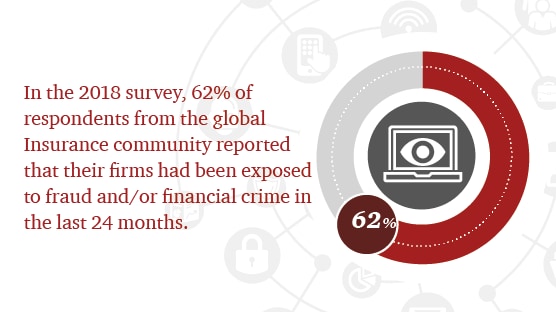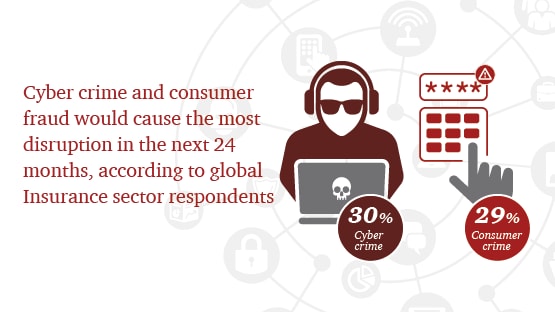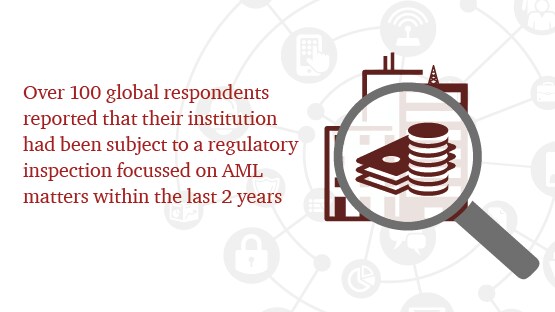
The Insurance sector’s ongoing fight against fraud and financial crime
Insurers across the globe continue to do battle against fraud and financial crime, and these efforts have broadly had a positive impact. However, the risks are evolving, technology is advancing at a rapid pace, and regulators are starting to show interest in applying more scrutiny on insurers’ risk management frameworks. In this context, how can insurers be confident that they are effectively and efficiently managing their fraud and financial crime risks?
PwC’s 2018 Global Economic Crime Survey included over 275 responses from the global Insurance community. These responses provide rich insights into recent experiences, and current perceptions, of those facing off to fraud and financial crime risks within this sector:
- More insurance firms reported having experienced fraud and financial crime
- Disruption over the next two years
- Experience of the Insurance community
More insurance firms reported having experienced fraud and financial crime
More insurance firms than ever before reported having experienced fraud and financial crime in the last two years.
In the 2018 survey, 62% of respondents from the global Insurance community reported that their firms had been exposed to fraud and/or financial crime in the last 24 months. This marks a significant increase from previous surveys – the figure in 2016 was 37%, and for 2014 it was 35%.
The most regular offender was consumer fraud (67% of respondents), however many respondents reported actual exposure to a wide range of financial crime threats, including: asset misappropriation (46%), business misconduct (36%), cybercrime (25%), bribery and corruption (17%), accounting fraud (14%), procurement fraud (14%) and money laundering (9%).

Disruption over the next two years
Disruption over the next two years in the Insurance sector is expected to come from all manner of fraud and financial crime risk areas.
When asked about what would cause the most disruption in the next 24 months, the highest number of global Insurance sector respondents pointed to cybercrime (30%) and consumer fraud (29%). However, many acknowledged that disruption could originate from a wide spectrum of risk areas including: business misconduct (9%), asset misappropriation (7%), money laundering (6%), and bribery and corruption (5%).

Experience of the Insurance community
Experience of the Insurance community indicates that regulatory scrutiny of anti-money laundering (AML) measures is on the rise.
Over 80 global respondents reported that their institution had been subject to a regulatory inspection focussed on AML matters within the last 2 years. Furthermore, over 30% of these respondents stated that their firm was either addressing major feedback following the inspection or was under an enforced remediation program.

Taken together, these global results serve as a clear reminder to firms in the Insurance sector of the importance of investing in fit-for-purpose fraud and financial crime risk management frameworks:
- Fraud and financial crime risks continue to be at an elevated level, and in this context it is prudent for firms to refresh their understanding of known schemes and related risks for the purposes of enhancing their prevention and detection efforts;
- Firms have more access to rich data than ever before, however they should take care to ensure that the most useful inputs are included in their data models. If they don’t, preventive and detective technology solutions will be less effective.
- If it was ever true that Financial Crime regulators were overlooking the Insurance community, this no longer appears to be the case. For example, the UK Financial Conduct Authority (FCA) has extended its Financial Crime supervision program to include annually visiting a random sample of firms who are subject to the Money Laundering Regulations per year. The FCA has taken this measure in the hope of applying pressure to the firms it regulates to encourage them to improve general standards.
- Firms should be mindful of the experiences within other sectors when reflecting on where their financial crime risk mitigation frameworks may present weaknesses. Despite regulators generally considering them to be lower risk entities from a Financial Crime perspective, insurers will still be expected to be able to demonstrate robust policies and procedures that comply with regulatory expectations.
Contact us

Harry Holdstock
Fraud and Regulatory Protection Leader, PwC United Kingdom
Tel: +44 (0)7706 284348







